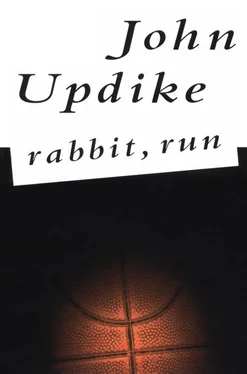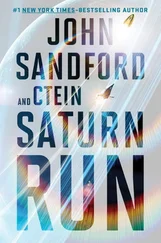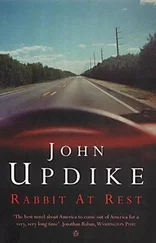The straight path is made smooth. Mr. Springer had been paying rent on the apartment all along, it turns out; he is a personal friend of the landlord and had arranged it without troubling his daughter. He always had a hunch Harry would come back but didn't want to advertise it in case he was wrong. Harry and Nelson move in and start housekeeping. Rabbit has a gift for housekeeping; the sensation of dust sucking into the vacuum cleaner, down the cloth hose, into a paper bag that when it is full of compact gray fluff will pop the cover of the Electrolux like a gentleman tipping his hat, pleases him. He was not entirely miscast as a barker for the MagiPeel Peeler; he has an instinctive taste for the small appliances of civilization, the little grinders and slicers and holders. Perhaps the oldest child should always be a girl; Mim, coming after him to the Angstrom household, was never exposed direct to the bright heart of the kitchen, but was always in his shadow with the housework, and sullen about assuming her share, which eventually became the greater share, because he was, after all, a boy. He supposes it will be the same with Nelson and Rebecca.
Nelson is a help. Closer to three now than two, the child can carry out orders that do not take him out of the room, understands that his toys belong in the bushel basket, and feels the happiness in cleanness, order, and light. The June breeze sighs at the screens of the long—closed windows. The sun dots the mesh with hundreds of sparkling T's and L's. Beyond the windows Wilbur Street falls away. The flat tin—and—tar roofs of their neighbors, weathered into gentle corrugations, glitter with mysterious pockets of rubble, candy—bar wrappers and a pool of glass flakes, litter that must have fallen from the clouds or been brought by birds to this street in the sky, planted with television aerials and hooded chimneys the size of fire hydrants. There are three of these roofs on the down side, tipped like terraces for drainage, three broad dirty steps leading to a brink below which the better homes begin, the stucco and brick forts, rugged with porches and dormer windows and lightning rods, guarded by conifers, protected by treaties with banks and firms of lawyers. It was strange that a row of tenements had been set above them; they had been tricked by growth. But in a town built against a mountain, height was too common to be precious; above them all there was the primitive ridge, the dark slum of forest, separated from the decent part of town by a band of unpaved lanes, derelict farmhouses, a cemetery, and a few raw young developments. Wilbur Street was paved for a block past Rabbit's door, and then became a street of mud and gravel between two short rows of ranch—houses of alternating color erected in 1953 on scraped red earth that even now is unsteadily pinned by the blades of grass that speckle it, so that after a good rain the gutter—water flows orange down Wilbur Street. The land grows steeper still, and the woods begin.
Straight out from the windows Rabbit can look in the opposite direction across the town into the wide farm valley, with its golf course. He thinks, My valley. My home. The blemished greenpapered walls, the scatter rugs whose corners keep turning under, the closet whose door bumps the television set, unknown to his senses for months, have returned with unexpected force. Every corner locks against a remembered corner in his mind; every crevice, every irregularity in the paint clicks against a nick already in his brain.
Under the sofa and chairs and behind doors and in the footspace under the kitchen cabinets he finds old fragments of toys that delight Nelson. The child has a perfect memory for his own possessions. "Mom—mom gay me dis."Holding up a plastic duck that had lost its wheels.
"She did?"
"Yop. Mom—mom did."
"Wasn't that nice of Mom—mom?"
"Yop."
"You know what?"
"What?"
"Mom—mom is Mommy's mommy!"
"Yop. Where Mommy?"
"At the hospital."
"At hop—pital? Come back Fi—day?"
"That's right. She'll come back Friday. Won't she be happy to see how clean we make everything?"
"Yop. Daddy at hop—pital?"
"No. Daddy wasn't at the hospital. Daddy was away."
"Daddy away" – the boy's eyes widen and his mouth drops open as he stares into the familiar concept of "away"; his voice deepens with the seriousness of it – "long." His arms go out to measure the length, so far his fingers bend backward. It is as long as he can measure.
"But Daddy's not away now, is he?"
"Nope."
He takes Nelson with him in the car the day he goes to tell Mrs. Smith he has to quit working in her garden. Old man Springer has offered him a job in one of his lots. The rhododendron trees by the crunching driveway look dusty and barren with a few brown corsages still hanging to their branches. Mrs. Smith herself comes to the door. "Yes, yes," she croons, her brown face beaming.
"Mrs. Smith, this is my son Nelson."
"Yes, yes, how do you do, Nelson? You have your father's head." She pats the small head with a hand withered like a tobacco leaf. "Now let me think. Where did I put that jar of old candy? He can eat candy, can't he?"
"I guess a little but don't go looking for it."
"I will too, if I want to. The trouble with you, young man, you never gave me credit for any competence whatsoever." She totters off, plucking with one hand at the front of her dress and poking the other into the air before her, as if she's brushing away cobwebs.
While she's out of the room he and Nelson stand looking at the high ceiling of this parlor, at the tall windows with mullions as thin as chalk—lines, through whose panes, some of which are tinted lavender, they can see the elms and hemlocks that guard the far rim of the estate. Paintings hang on the shining walls. One shows, in dark colors, a woman wrapped in a whipping strip of silk apparently having an argument, from the way her arms are flailing, with a big swan that just stands there pushing. On another wall there is a portrait of a young woman in a black gown sitting in a padded chair impatiently. Her face, though squarish, is finelooking, with a triangular forehead caused by her hairdo. Round white arms curve into her lap. Rabbit moves a few steps closer to get a less oblique view. She has that short puffy little upper lip that is so good in a girl: the way it lifts to let a dab of dark come between her lips. There is this readiness about her all over. He feels that she's about to get out of the chair and step forward toward him with a frown on her triangular forehead. Mrs. Smith, returning with a crimson glass ball on a stem like a wineglass, sees where he's looking and says, "What I always minded was, Why did he have to make me look so irritable? I didn't like him a whit and he knew it. A slick little Italian. Thought he knew about women. Here." She has crossed to Nelson with the candy glass. "You try one of these. They're old but good like a lot of old things in this world." She takes off the lid, a knobbed hemisphere of translucent red glass, and holds it waggling in her hand. Nelson looks over and Rabbit nods at him to go ahead and he chooses a piece wrapped in colored tinfoil.
"You won't like it," Rabbit tells him. "That's gonna have a cherry inside."
"Shoosh," Mrs. Smith says. "Let the boy have the one he wants." So the poor kid goes ahead and takes it, bewitched by the tinfoil.
"Mrs. Smith," Rabbit begins, "I don't know if Reverend Eccles has told you, but my situation has kind of changed and I have to take another job. I won't be able to help around here any more. I'm sorry."
"Yes, yes," she says, alertly watching Nelson fumble at the tinfoil.
"I've really enjoyed it," he goes on. "It was sort oflike Heaven, like that woman said."
"Oh that foolish woman Alma Foster," Mrs. Smith says. "With her lipstick halfway up to her nose. I'll never forget her, the dear soul. Not a brain in her body. Here, child. Give it to Mrs. Smith." She sets the dish down on a round marble table holding only an oriental vase fizll of peonies and takes the piece of candy from Nelson and with a frantic needling motion of her fingers works the paper off. The kid stands there staring up with an open mouth; she thrusts her hand down jerkily and pops the ball of chocolate between his lips. With a crease of satisfaction in one cheek she turns, drops the tinfoil on the table, and says to Rabbit, "Well, Harry. At least we brought the rhodies in."
Читать дальше












